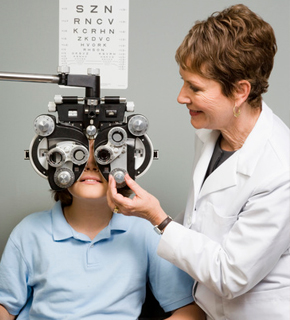A watch exam contains not only checking to ascertain if you will need glasses. During a comprehensive eye exam, we not merely determine your prescription for glasses or contact lenses, additionally we assess your eyes’ capacity to interact together (binocular vision). The dilated part of the comprehensive eye exam helps us look for eye diseases such as glaucoma, cataract, and macular degeneration; helping us evaluate the eyes for signs and symptoms of systemic disease such as diabetes, high blood pressure, even brain tumors. Adults and kids should have routine eye exams to keep prescriptions current also to check for early signs and symptoms of eye diseases. Early detection can prevent vision loss.
Here’s a listing of several eye conditions and eye diseases that people look for within a comprehensive eye exam:
Refractive error: Here’s your eyes’ “optical” prescription. You will find 3 kinds of refractive error, myopia (nearsightedness), hyperopia (farsightedness), and astigmatism (irregular contour around the eye which ends up in two separate focal points). These conditions can be corrected with glasses, lenses, and refractive surgery.
Presbyopia: This is actually the eyes inability to focus in close proximity. Such things happen due to the aging process. This condition may be corrected with glasses, contacts, and refractive surgery.
Amblyopia: Amblyopia is poor progression of central vision as a result of a turned eye or even a large asymmetry (difference) in refractive error backward and forward eyes. If untreated, amblyopia can slow visual development of the affected eye, resulted in permanent vision loss.

Strabismus: Strabismus is an eye that turns inwards or outwards in accordance with one other eye. If left untreated, a strabismus can result in amblyopia, and decrease depth perception.
Glaucoma: Glaucoma may be the degeneration with the optic nerve (a nerve tract that connects and transmits information in the eye towards the brain) often associated with high eye pressures. Within a comprehensive eye exam, we perform numerous tests that inform us if you’ve glaucoma. Because there are without any symptoms, it is important to have regular eye exams to avoid permanent vision loss.
Macular degeneration: Macular Degeneration can be a illness that affects the small “sweet spot” (macula) from the retina critical for acute central vision tasks including reading, driving, and viewing television. An extensive examination can detect the condition continuing.
Cataracts: A cataract can be a clouding of the crystalline lens which rests just behind the coloured part of the eye. Once cataracts develop patients often feel as if they may be looking through a dirty window pane, which may cause signs of glare during the night.
Systemic diseases: A thorough eye exam can detect early signs of many systemic diseases including diabetes as well as blood pressure level.
More information about Irvine Optometrist view our web page.
